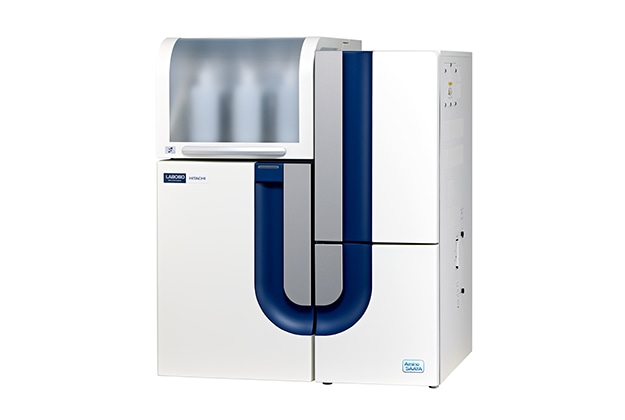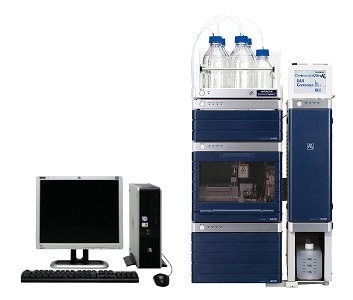High-Speed Amino Acid Analyzer LA8080 AminoSAAYA

Developed with the user in mind, the AminoSAAYA offers easy and comfortable operability while maintaining the reliability and stability of Hitachi’s legacy amino acid analyzers.
Features
Ergonomic Design
Designed from the perspective of the user, the AminoSAAYA’s daily workflow, movements, and operational requirements are extremely simplified.
The height of the reagent setup unit accommodates better accessibility. Daily tasks such as reagent replacement, sample setup, and maintenance are made easy and can all be done from a standing position (the work requiring a half-sitting position has been minimized).

Space-saving compact design
This new design resulted in a unit with a footprint that is 30% less than the previous models. In addition, this unit is designed to be placed on a standard laboratory benchtop.
The use of Hitachi’s highly reliable and stable post-column Ninhydrin method ensures compatibility with methods run on previous models (L-8800/L-8900).
The reliability and stability cultivated over many years have been maintained in this new system. The analysis methods are inherited from previous models, and the basic analytical conditions, columns (packing materials), and reagents that have been in use can also be used without making any changes.
Select the analysis method (column, reagent, and analytical conditions) depending on your required analysis (Protein Hydrolysates (PH) or Physiological Fluids (PF)).
Commercially available buffer solutions and reaction reagents (dedicated reagents) can be used without preparation.
Unstable Ninhydrin reagents usually require refrigeration. However, with the Hitachi amino acid analyzer, the two solutions are mixed immediately before the derivatization reaction. Therefore, there is no need for refrigeration.
Data
Analysis Example: STANDARD ANALYSIS COLUMN (Protein Hydrolysate analysis method)

Specifications
System performance (by protein hydrolysate analysis method)
| Analysis time | Approx. 30 minutes (Net) |
|---|---|
| Resolution | Thr-Ser、Gly-Ala、Ile-leu, more than 1.2 |
| Reproductively of the peak retention time | RSD 0.5% or less (Ala peak) RSD 0.3% or less (Arg peak) |
| Reproductively of the peak area | RSD 1.0% or less (Gly, His peak) |
| Detection limit | 2.5 pmol (S/N = 2 at Asp peak) |
System performance (by physiological fluid analysis method)
| Analysis time | Approx. 110 minutes (Net) |
|---|---|
| Resolution | Thr-Ser、Gly-Ala、Ile-leu, more than 1.2 |
| Reproductively of the peak retention time | RSD 0.5% or less (Ala peak) RSD 0.3% or less (Arg peak) |
| Reproductively of the peak area | RSD 1.5% or less (Gly, His peak) |
| Detection limit | 8pmol(S/N = 2 at Asp peak) |
Analyzer
| Column | Size: 4.6 mm ID × 60 mm * |
|---|---|
| Resin: Hitachi custom ion exchange resin | |
| Pump | Flow rate setting range: 0.001-1.000 mL/min |
| Discharge pressure: 0 - 34 MPa | |
| Gradient elution method with 6 solutions | |
| Autosampler | Injection method: Direct injection method |
| Sample vial capacity: 1,500 µL | |
| No. of vials accommodated:120(with optional cooling unit installed: 100) | |
| Sample injection volume: 0.5 - 100 µL | |
| Column oven | System: Peltier |
| Temperature setting: 20 - 90 °C (in 1 °C steps) | |
| Reaction unit | System: Electronic heating |
| Temperature setting: 50 - 140 °C (in 1 °C steps) | |
| Detector | Spectrophotometer: Aberration-corrected |
| concave diffraction grating | |
| Wavelength: 570 nm, 440 nm |
Others
| Dimensions (excluding PC) | 700 (W) × 600 (D) × 850 (H) mm |
|---|---|
| Temperature range | 15 - 35 °C |
| Power supply | 100, 115, 220, 230, 240 V ± 10 V, 800 VA, 50 or 60 Hz |
| Nitrogen gas | Nitrogen gas source must be prepared. |
* Standard column
Videos
Features of AminoSAAYA
Brief presentation of LA8080 AminoSAAYA: its compactness, ease of use and reliability.

The product story
Masahito Ito, Ph.D., an engineer of Optics Design Department, talks about features of LA8080.

Introducing the measurement example using high-speed amino acid analyzer.
The basics of HPLC, from "Principles and system configuration" to "Feature of various detection methods."
The basics of Amino Acid Analyzer, from "Principle and basics of amino acid analysis" to "Method for analyzing amino acids".
The trademark that represents our strong bond with the customer and shows our pledge to connect science and society to create new value.



